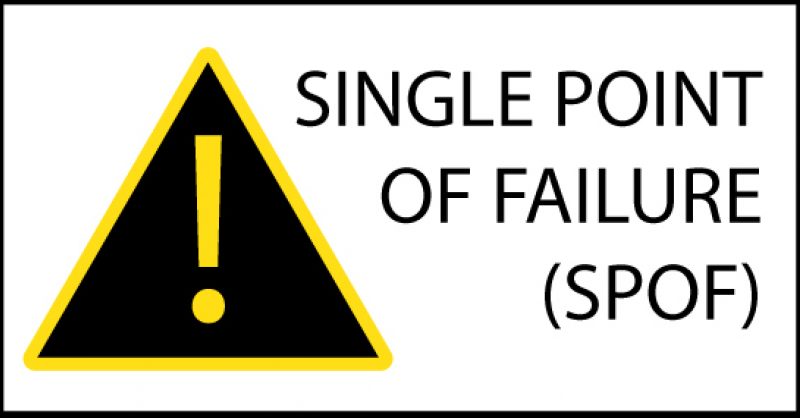What are YOUR SPOFs, and How Do You Prevent Them From Ruining You?

Most orthodontists don’t consider themselves entrepreneurs. It’s not a dig at them. It’s simply the case. They consider themselves de facto business owners, clinicians and perhaps managers, but entrepreneurs? No way. Don’t believe me? Ask most orthodontists to tell you the difference between their AOV and their CPA (no, not their accountant) and they will likely stare at you wide eyed.
There are many business and entrepreneurial concepts that we simply never learned in our residencies and subsequent career experience. Orthodontists are smart people by nature and self discovery is strong in this group, but adventures in entrepreneurialism are rare.
So, I will ask the same question as the header: “What are your SPOFs?” Don’t know what that means? Let’s go there together.
SPOF is a very common business acronym that stands for “Single Points Of Failure”. Simply defined, it is: ” a part of a system that, if it fails, will stop the entire system from working.”
Take a look at the example below. It’s a very basic computer setup with an SPOF.

In this example, it’s pretty clear the the router is the only thing holding together the network and if that single point of contact fails, the entire system is out of order.
So, I will ask you again: “What are YOUR SPOF’s and how can you prevent them from taking down your business?”
Here are 10 examples of SPOF in businesses (with solutions) as listed by “Thinkingbusinessblog.com”:
- Machinery – the business relies on a single piece of machinery or software to produce its products or services.
- Internet – the business relies on the internet to generate revenue. If everyone is working from the same location and the internet goes down, so does your revenue!
- Power – the business relies on power to its building to generate revenue. Consequently, if everyone is working from the same location and the power goes out, your revenue disappears!
- Building – the business needs a physical structure to generate revenue. Therefore, if everyone is working from the same building and the building becomes inaccessible, your revenue disappears!
- A person – there is a person in your business that is responsible for generating or enabling the majority of your revenue
- A patent – the business relies on a single patent or a small number of patents to generate revenue. What happens to your revenue when the patent expires? What happens if there is a patent dispute and someone files an injunction that restricts you from using that patent?
- Software (accounting, point of sale, engineering, database, website) – many organizations today rely heavily on software to keep their business operating (e.g., airlines). What happens when the software crashes? What happens in the event of maliciously hacking?
- An industry – the business depends on a single industry to provide it business
- Government regulation – governments are notorious for changing regulations without understanding the impact to business. Some businesses depend on one or more regulations to keep them viable.
- Supply chain – supply chain interruptions for a product manufacturing company can be devastating
How to deal with SPOF
So, look at that list and think of where you might be vulnerable. Does your office rely too heavily on a member of your team (including you)? Do you have a plan if your server crashes? What about if your scanner goes down? Your lead assistant is out for an extended time? You get the idea. An SPOF can cripple you if you don’t have a back up plan, so start thunking about what you can do to protect yourself.
Remember, dealing with an SPOF is like buying life insurance or taking a vitamin. It’s not glamorous, nor will it yield instant results, but you need it to protect yourself. Take the time to identify your single points of failure and start outlining some ways in which you can protect yourself. Like insurance, we all hope we’ll never need to use these contingency plans, but if you need to, you’ll sure be thrilled you had one.
…and if you do, your AOV and CPA won’t change. ????
Wishing you the best,

If you want to be a part of a geographically exclusive Facebook group (OrthopreneursRD) where we come together to help each other build better practices and lower stress, please message me. To learn more about your region’s availability and what it’s all about, click HERE.
GLENN KRIEGER IS AN ORTHODONTIST WITH 20 YEARS OF RESTORATIVE AND COSMETIC DENTISTRY EXPERIENCE BEFORE HE RETURNED TO ORTHODONTIC RESIDENCY. DR. KRIEGER LEARNED ABOUT THE IMPORTANCE OF WELL-DESIGNED PRACTICE POLICIES AND SYSTEMS DURING A YEAR AT THE SCHUSTER CENTER FOR PROFESSIONAL DEVELOPMENT IN SCOTTSDALE ARIZONA, AND AN UNDERSTANDING OF GENERAL ACCOUNTING PRACTICES AND INDUSTRIAL PSYCHOLOGY AT THE UNIVERSITY OF WASHINGTON GRADUATE BUSINESS SCHOOL’S “DENTIST AS CEO” PROGRAM. HE IS THE HOST OF “THE ORTHOPRENEURS PODCAST”, MANAGES THE ORTHOPRENEURS FACEBOOK GROUP AND RUNS THE ANNUAL ORTHOPRENEURS SUMMIT.


Responses